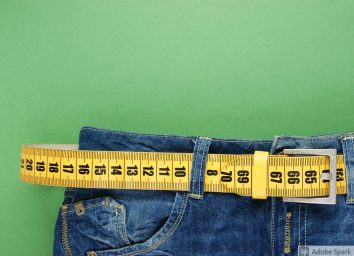The "Dangerous" Workout Plan With More Than 130 Million Views on TikTok

Anyone who uses TikTok knows that the app is overflowing with health and fitness advice. After all, it's where millions of users are learning about the nasty secret ingredients hiding in ground coffee while also learning about the new walking craze that fitness experts say is actually worthwhile.
But, as many have noted, not all of the healthy living advice you'll find on TikTok passes muster, and few fads on the platform have gained anywhere near the attention of the 75 Hard Challenge, which was created by author, podcaster, and motivational speaker Andy Frisella. Read on for more about the 75 Hard Challenge and learn what health experts are saying about it. And for more science-backed health advice, see here to learn What Walking for Just 20 Minutes Does to Your Body, According to Science.
So, What Exactly Is the 75 Hard Challenge?
Frisella is an entrepreneur, a supplement company owner, a self-described "car nerd" and "expert at customer loyalty," and the host of the podcast Real AF. He's also the author of a children's book series called "Otis & Charley's Hardworking Tails," which follows two titular bulldogs whose stories contain lessons that help teach kids the "values and work ethic it takes to be successful and dominate in life." What he's apparently not is a credentialed trainer or dietitian. Regardless, in 2019, he introduced the 75 Hard Challenge on his podcast, and he bills it not as a fitness and weight loss program, per se, but a "mental toughness challenge" based on his two decades of personal study and "real-life experience."
"Think of this as an Ironman for your brain," his website says.
So far, videos related to the 75 Hard Challenge reportedly have nearly 130 million views on TikTok.
For no charge and for surrendering your email address, Frisella sends over all of the details of the plan. Here are the basic pillars that I received in my own inbox, which must be completed every day for a 75 consecutive days:
- Follow any diet. Frisella doesn't specify which diet, only that "it must be a structured plan designed with physical improvement in mind."
- You must complete two 45-minute workouts each day, and at least one of those workouts is required to be outdoors.
- You are forbidden to have any alcohol or cheat meals at all.
- You need to take selfies every day to track your progress.
- You need to successfully drink a full gallon of water.
- You need to read at least 10 pages of a book, and he notes that audiobooks are verboten.
- He concludes with: "If you fail, you MUST start over on Day 1."
He provides no further explanation on any of those marching orders.
What Are the Leading Health Experts Saying About It?
Setting aside his reading and selfie instructions, health experts note that the lack of specificity on the diet portion that leaves too much room for interpretation and therefore health risks. After all, sticking to a regimented diet for 75 days straight with no cheat-meals marbled into the plan is a pretty hardcore ask—especially if you're following restrictive diets such as keto, paleo, and others.
"For the average person, [these fad diets] are often excessively restrictive and not particularly sustainable as they include cutting out whole food groups," Sophie Medlin, a dietitian and Chair for the British Dietetic Association for London, explained to Men's Health UK.
She also warns against the no-cheat meal rule. "When there's no flexibility and you're not allowed any of the things we associate with social eating, that can be really harmful to people," she told the magazine.

The vagueness of the workout plan is both potentially dangerous and not-sustainable at the same time, warn other experts. "The workout plan is so nonspecific that you're at great risk for injury," Albert R. Matheny, certified strength and conditioning specialist and gym owner in New York City, explained to Cosmo. He also notes that workout routines are ideal when you're incrementally increasing your intensity as you go along, building your way up. Doing the same workouts every day, twice a day? It's a recipe for not only boredom but also burning out, he says.
Also, the water. "Four liters is a ludicrous amount of water," Barbie Boules, RDN, explained to Refinery29. "This is way too generalized and could be a dangerous amount for some people."
But will you get mentally tougher?
Perhaps. And though the challenge has no shortage of proponents who tout its success, experts do warn you to proceed with caution. As Ayana Ali, a therapist and licensed clinical social worker, described to Cosmo, taking on such a regimented lifestyle that requires outsize self-discipline, provides no wiggle-room for error, and offers big punishment for missteps (starting over), it can, in itself, "damage your mental health."
"At first glance, to some the program might look simple," writes Frisella in his introductory email. "It is. But don't confuse simple & easy."
Or confuse "simple" with being a good idea. As with all things fad and health, proceed with caution. And for more healthy living advice, read about The Single Most Effective Way to Work Out Every Day, Say Psychologists








